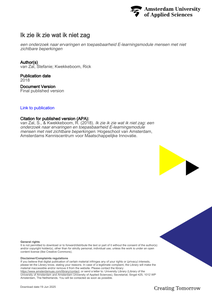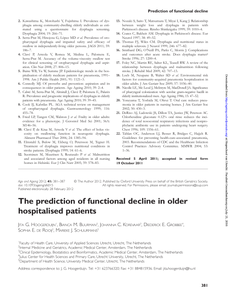Een actieonderzoek naar de ontwikkeling van een leerlingversterkend onderwijsprogramma met het doel leerlingen met een visuele beperking beter voor te bereiden op hun transitie naar volwassenheid en waar mogelijk een betaalde baan. Belangrijke thema's: inclusie en exclusie, empowerment, stem van de leerling, transitie naar volwassenheid en het burgerschapsmodel tegenover het medische model.
DOCUMENT

De sociale participatie van leerlingen met extra ondersteuningsbehoeften is de afgelopen decennia veelvuldig onderzocht. Opmerkelijk is dat veel van deze studies voornamelijk gaan over het functioneren van de klas en de leerkracht en leerlingen en minder onderzoek is uitgevoerd samen met de direct betrokkenen van een klas. Het gevolg is dat er weinig bekend is over wat er in de klas gedaan wordt om sociale participatie te stimuleren en wat leerkrachten en leerlingen van deze strategieën vinden. In een recent promotieonderzoek is er vanuit het perspectief van 1) de leerkracht, 2) leerlingen met gedragsproblemen en 3) de voorhanden empirische literatuur bekeken hoe sociale participatie gestimuleerd wordt en welke behoeftes er zijn om sociale participatie te verbeteren. Dit artikel presenteert diverse uitgevoerde studies en bevindingen vanuit de drie bovenstaande perspectieven. Op basis van de studies kunnen twee hoofdconclusies getrokken worden. De eerste conclusie is dat leerkrachten meer zouden moeten handelen vanuit de behoeften van een leerling, in plaats van te handelen op basis van de gedragsproblemen van de leerling. De tweede conclusie is dat het perspectief van de leerling onderbelicht is met betrekking tot het verbeteren van de sociale participatie in de klas. Het artikel sluit af met aanbevelingen voor orthopedagogen en beleidsmakers, om zo doende leerkrachten en professionals te ondersteunen om de sociale behoeften van leerlingen centraal te stellen in de vorming van onderwijs. Alleen zo kan de zorg geleverd worden om Passend Onderwijs ook daadwerkelijk passend te laten zijn voor iedere leerling.
MULTIFILE

Parental involvement is a crucial force in children’s development, learning and success at school and in life [1]. Participation, defined by the World Health Organization as ‘a person’s involvement in life situations’ [2] for children means involvement in everyday activities, such as recreational, leisure, school and household activities [3]. Several authors use the term social participation emphasising the importance of engagement in social situations [4, 5]. Children’s participation in daily life is vital for healthy development, social and physical competencies, social-emotional well-being, sense of meaning and purpose in life [6]. Through participation in different social contexts, children gather the knowledge and skills needed to interact, play, work, and live with other people [4, 7, 8]. Unfortunately, research shows that children with a physical disability are at risk of lower participation in everyday activities [9]; they participate less frequently in almost all activities compared with children without physical disabilities [10, 11], have fewer friends and often feel socially isolated [12-14]. Parents, in particular, positively influence the participation of their children with a physical disability at school, at home and in the community [15]. They undertake many actions to improve their child’s participation in daily life [15, 16]. However, little information is available about what parents of children with a physical disability do to enable their child’s participation, what they come across and what kind of needs they have. The overall aim of this thesis was to investigate parents’ actions, challenges, and needs while enhancing the participation of their school-aged child with a physical disability. In order to achieve this aim, two steps have been made. In the first step, the literature has been examined to explore the topic of this thesis (actions, challenges and needs) and to clarify definitions for the concepts of participation and social participation. Second, for the purposes of giving breadth and depth of understanding of the topic of this thesis a mixed methods approach using three different empirical research methods [17-19], was applied to gather information from parents regarding their actions, challenges and needs.
DOCUMENT

Mensen die te kampen hebben met een beperking kunnen op veel onbegrip stuiten op het moment dat zij proberen deel te nemen aan de samenleving. Dat geldt vooral voor hen van wie de beperking niet (onmiddellijk) duidelijk zichtbaar of merkbaar is. In dit onderzoek wordt een e-learningsmodule, ontworpen om medewerkers van de Gemeente Amsterdam beter toegerust te maken om dienst te verlenen aan mensen met onzichtbare beperkingen. Door middel van vragenlijsten en focusgroepen voor, en na het afnemen van de e-learninsmodule, en een groepsgesprek na 2 maanden toepassen van de opgedane kennis, wordt het nut van de e-learninsmodule beoordeeld.
DOCUMENT

Thirty to sixty per cent of older patients experience functional decline after hospitalisation, associated with an increase in dependence, readmission, nursing home placement and mortality. First step in prevention is the identification of patients at risk. The objective of this study is to develop and validate a prediction model to assess the risk of functional decline in older hospitalised patients.
DOCUMENT

This project builds upon a collaboration which has been established since 15 years in the field of social work between teachers and lecturers of Zuyd University, HU University and Elte University. Another network joining this project was CARe Europe, an NGO aimed at improving community care throughout Europe. Before the start of the project already HU University, Tallinn Mental Health Centre and Kwintes were participating in this network. In the course of several international meetings (e.g. CARe Europe conference in Prague in 2005, ENSACT conferences in Dubrovnik in 2009, and Brussels in April 2011, ESN conference in Brussels in March 2011), and many local meetings, it became clear that professionals in the social sector have difficulties to change current practices. There is a great need to develop new methods, which professionals can use to create community care.
DOCUMENT

This research concerning the experience and future of zoos was carried out from 2011-2012 and takes regional ideas concerning Zoo Emmen as well as global visions into account. The research focuses partly on Zoo Emmen, its present attractions and visitors while also comparing and contrasting visions on the future in relationship to other international zoos in the world. In this way, remarkable experiences and ideas will be identified and in the light of them, it can serve as inspiration for stakeholders of zoos at large. The main research subject is a look at the future zoos in view of: The Zoo Experience – an international experience benchmark; The Zoo of the Future – a Scenario Planning approach towards the future; The virtual zoo - zoo’s in the internet domain.
DOCUMENT

This article describes a European project which was aimed at improving the situation of persons with psychiatric or learning disabilities with regard to social participation and citizenship. The project took place in three countries (Estonia, Hungary and the Netherlands) and four cities (Tallinn, Budapest, Amersfoort and Maastricht). The project included research and actions at the policy level, the organizational level and the practice level. At the policy level, the framework of the United Nations Convention on the Rights of Persons with Disabilities (United Nations, 2006) and the European Disability Strategy (European Commission, 2010) were used to look at national and local policies, at the reality of the lives of those with disabilities and at the support that professional services offer with regard to participation and inclusion. The project generated a number of insights, recommendations and methods by which to improve the quality of services and increase the number of opportunities for community engagement. In this article, we present some of the lessons learned from the meta-analysis. Although the circumstances in each country are quite different with regard to policy, culture and service systems, it is remarkable that people with disabilities face many of the same problems. The study shows that in all three countries, access to services could be improved. Barriers include bureaucratic procedures and a lack of services. The research identified that in every country and city there are considerable barriers regarding equal participation in the field of housing, work and leisure activities. In addition to financial barriers, there are the barriers of stigma and self-stigmatization. Marginalization keeps people in an unequal position and hinders their recovery and participation. In all countries, professionals need to develop a stronger focus on supporting the participation of their clients in public life and in the development of different roles pertaining to citizenship
DOCUMENT

In deze lectorale rede worden allereerst een aantal belangrijke ontwikkelingen geschetst, zoals die plaatsvinden in educatieve praktijken. Het gaat dan om toenemende globalisering en de daarmee gepaard gaande demografische, sociale en economische veranderingen, de transitie van een medisch model van kijken naar kinderen en jongeren met gedragsproblemen en leermoeilijkheden naar een sociaal model, en de professionaliteit van leerkrachten die onder druk is komen te staan. Wat betekenen deze voor het denken over professionaliteit en welke doelstellingen komen daaruit voort voor het lectoraat Professionele waarden in kritische dialoog? In het tweede deel wordt ingegaan op verschillende opvattingen over professionaliteit: de autonome, reflectieve, normatieve en democratische professionaliteit. Al deze opvattingen zijn belangrijk voor de professionele ontwikkeling van leerkrachten anno 2010, maar de laatste twee zijn de belangrijkste daarin. In deel drie zet ik in het verlengde van de opvattingen over normatieve en democratische professionaliteit de drie pijlers voor dit lectoraat uiteen: relationele agency, waarden, en kritische dialoog. Deze vormen de grondslag voor het werkprogramma van het lectoraat, dat in het laatste deel aan de orde komt.
DOCUMENT

Dissertatie met als onderwerp het ontwerp en evaluatie van de Hogere Beroepsopleidding Orthopedische Technologie in Nederland. In deze dissertatie wordt naast het ontwerp van de opleiding ingegaan op een vergelijking die is gemaakt met andere opleidingen op het gebied van hoger orthopedisch technologisch onderwijs in de wereld.
DOCUMENT
